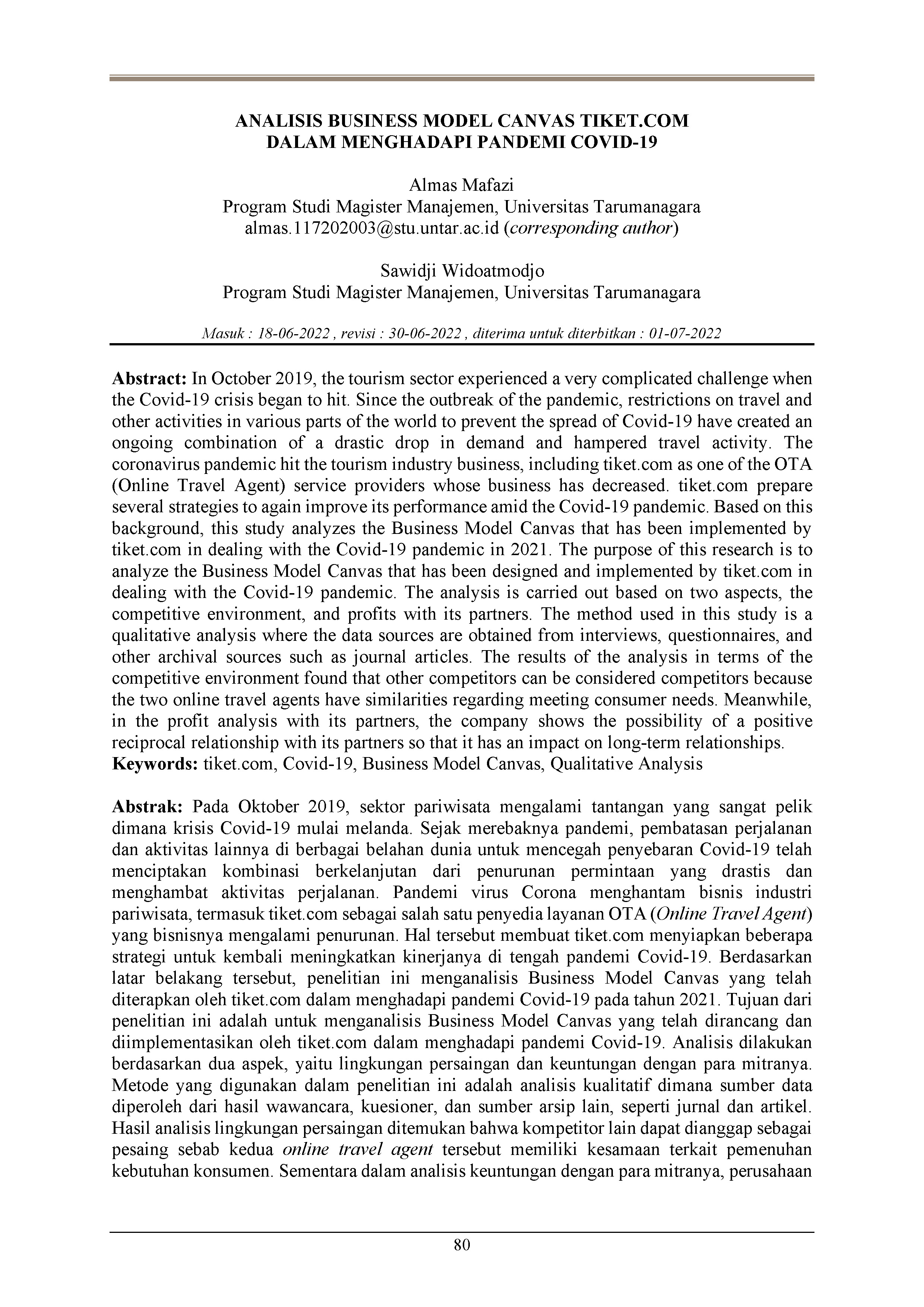Analisis business model canvas tiket.com dalam menghadapi pandemi Covid-19
Main Article Content
Abstract
In October 2019, the tourism sector experienced a very complicated challenge when the Covid-19 crisis began to hit. Since the outbreak of the pandemic, restrictions on travel and other activities in various parts of the world to prevent the spread of Covid-19 have created an ongoing combination of a drastic drop in demand and hampered travel activity. The coronavirus pandemic hit the tourism industry business, including tiket.com as one of the OTA (Online Travel Agent) service providers whose business has decreased. tiket.com prepare several strategies to again improve its performance amid the Covid-19 pandemic. Based on this background, this study analyzes the Business Model Canvas that has been implemented by tiket.com in dealing with the Covid-19 pandemic in 2021. The purpose of this research is to analyze the Business Model Canvas that has been designed and implemented by tiket.com in dealing with the Covid-19 pandemic. The analysis is carried out based on two aspects, the competitive environment, and profits with its partners. The method used in this study is a qualitative analysis where the data sources are obtained from interviews, questionnaires, and other archival sources such as journal articles. The results of the analysis in terms of the competitive environment found that other competitors can be considered competitors because the two online travel agents have similarities regarding meeting consumer needs. Meanwhile, in the profit analysis with its partners, the company shows the possibility of a positive reciprocal relationship with its partners so that it has an impact on long-term relationships.
Pada Oktober 2019, sektor pariwisata mengalami tantangan yang sangat pelik dimana krisis Covid-19 mulai melanda. Sejak merebaknya pandemi, pembatasan perjalanan dan aktivitas lainnya di berbagai belahan dunia untuk mencegah penyebaran Covid-19 telah menciptakan kombinasi berkelanjutan dari penurunan permintaan yang drastis dan menghambat aktivitas perjalanan. Pandemi virus Corona menghantam bisnis industri pariwisata, termasuk tiket.com sebagai salah satu penyedia layanan OTA (Online Travel Agent) yang bisnisnya mengalami penurunan. Hal tersebut membuat tiket.com menyiapkan beberapa strategi untuk kembali meningkatkan kinerjanya di tengah pandemi Covid-19. Berdasarkan latar belakang tersebut, penelitian ini menganalisis Business Model Canvas yang telah diterapkan oleh tiket.com dalam menghadapi pandemi Covid-19 pada tahun 2021. Tujuan dari penelitian ini adalah untuk menganalisis Business Model Canvas yang telah dirancang dan diimplementasikan oleh tiket.com dalam menghadapi pandemi Covid-19. Analisis dilakukan berdasarkan dua aspek, yaitu lingkungan persaingan dan keuntungan dengan para mitranya. Metode yang digunakan dalam penelitian ini adalah analisis kualitatif dimana sumber data diperoleh dari hasil wawancara, kuesioner, dan sumber arsip lain, seperti jurnal dan artikel. Hasil analisis lingkungan persaingan ditemukan bahwa kompetitor lain dapat dianggap sebagai pesaing sebab kedua online travel agent tersebut memiliki kesamaan terkait pemenuhan kebutuhan konsumen. Sementara dalam analisis keuntungan dengan para mitranya, perusahaan menunjukkan adanya kemungkinan hubungan timbal balik yang positif dengan para mitranya sehingga berdampak pada hubungan jangka panjang.
Article Details

This work is licensed under a Creative Commons Attribution-NonCommercial-ShareAlike 4.0 International License.
This work is licensed under a Jurnal Manajemen Bisnis dan Kewirausahaan Creative Commons Attribution-ShareAlike 4.0 International License.
References
Anisa, D. F. (2019, January 6). Sektor pariwisata berpeluang geser sawit sebagai penyumbang devisa terbesar. BeritaSatu. https://www.beritasatu.com/ekonomi/531159/sektor-pariwisata-berpeluang-geser-sawit-sebagai-penyumbang-devisa-terbesar
Asosiasi Penyelenggara Jasa Internet Indonesia (APJII). (2019). Laporan survei: Penetrasi & profil perilaku pengguna internet Indonesia tahun 2018. https://apjii.or.id/survei/surveiinternetapjii2018-21072045
Badan Pusat Statistik. (2020). Jumlah kunjungan wisatawan mancanegara ke Indonesia menurut kebangsaan (kunjungan). https://www.bps.go.id/indicator/16/1821/1/jumlah-kunjungan-wisatawan-mancanegara-ke-indonesia-menurut-kebangsaan.html
Barcelos, R. H., Dantas, D. C., & Sénécal, S. (2019). The tone of voice of tourism brands on social media: Does it matter? Tourism Management, 74, 173–189. https://doi.org/10.1016/j.tourman.2019.03.008
Bowen, J., & Whalen, E. (2017). Trends that are changing travel and tourism. Worldwide Hospitality and Tourism Themes, 9(6), 592–602. https://doi.org/10.1108/WHATT-09-2017-0045
Global Leadership Center (GLC). (2016). Apa itu business model canvas dan mengapa wajib digunakan setiap pemilik bisnis? Global Leadership Center (GLC). https://glcworld.co.id/penjelasan-business-model-canvas/
Hapsari, I. (2018, January 5). Hanya sekali akses, aplikasi tiket.com bisa memudahkan rencana perjalanan liburanku. Kumparan.com. https://kumparan.com/irma-hapsari/hanya-sekali-akses-aplikasi-tiket-com-bisa-memudahkan-rencana-perjalanan-liburanku/3
Isabelle, F., Dominique, K., & Statia, E. (2019). Home away from home: A longitudinal study of the holiday appropriation process. Tourism Management, 71, 327–336. https://doi.org/10.1016/j.tourman.2018.10.025
Kementerian Pariwisata dan Ekonomi Kreatif. (2022). Statistik Wisatawan Mancanegara. Kemenparekraf.go.id. https://kemenparekraf.go.id/statistik-wisatawan-mancanegara
Lidwina, A. (2021, February 11). Penurunan jumlah penerbangan global dalam satu tahun terakhir. Databoks.katadata.co.id. https://databoks.katadata.co.id/datapublish/2021/02/11/penerbangan-global-anjlok-sepanjang-2020-terimbas-covid-19
Marshall, C., & Rossman, G. B. (2006). Designing qualitative research (4th ed.). SAGE.
Moleong, L. J. (2018). Metodologi penelitian kualitatif (Rev). Remaja Rosdakarya.
Osterwalder, A., & Pigneur, Y. (2010). Business model generation: A handbook for visionaries, game changers, and challengers. Wiley.
Rusdi, J. F. (2007). Kamus komputer dan teknologi informasi. Informatika.
Rusdi, J. F. (2019). Peran teknologi informasi pada pariwisata Indonesia. Jurnal Accounting Information System (AIMS), 2(2), 78–117. https://doi.org/10.32627/aims.v2i2.336
Sugiyono. (2016). Metode penelitian kuantitatif, kualitatif, dan R&D. Alfabeta.
Thompson, A. A., Strickland, A. J., & Gamble, J. E. (2010). Crafting and executing strategy: The quest for competitive advantage: Concepts and cases (17th ed.). McGraw-Hill/Irwin.
Werthner, H., Alzua-Sorzabal, A., Cantoni, L., Dickinger, A., Gretzel, U., Jannach, D., Neidhardt, J., Pröll, B., Ricci, F., Scaglione, M., Stangl, B., Stock, O., & Zanker, M. (2015). Future research issues in IT and tourism: A manifesto as a result of the JITT workshop in June 2014, Vienna. Information Technology and Tourism, 15(1), 1–15. https://doi.org/10.1007/s40558-014-0021-9
World Economic Forum. (2018). The future of jobs report 2018. https://www.weforum.org/reports/the-future-of-jobs-report-2018/


